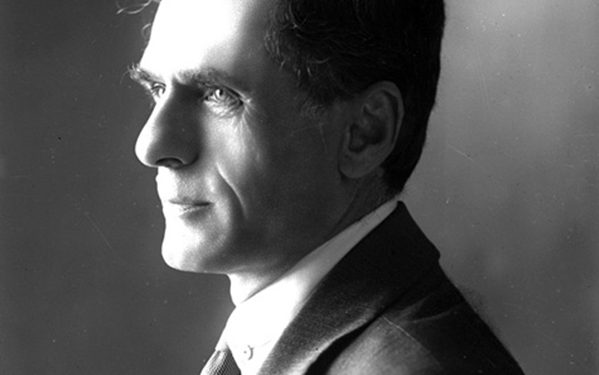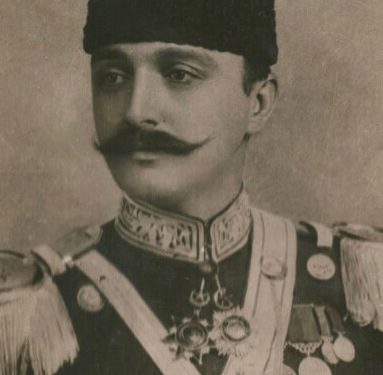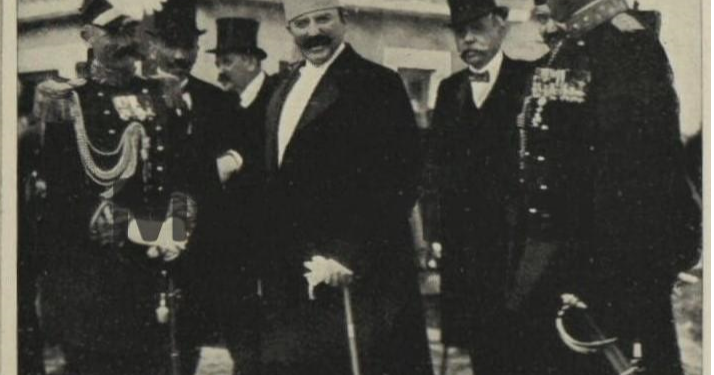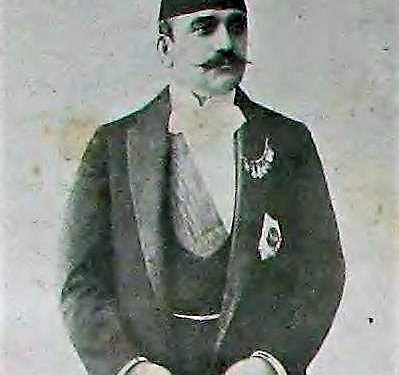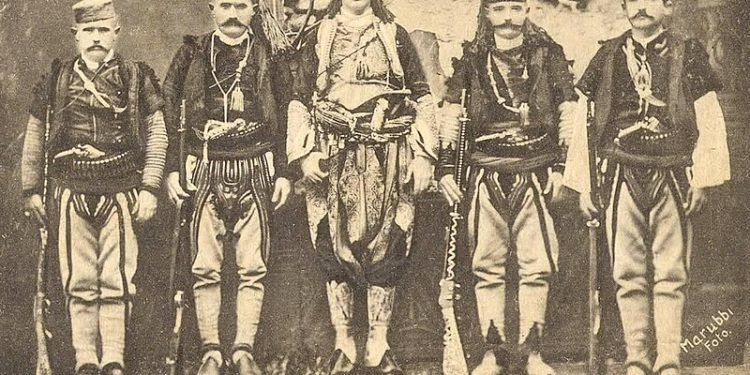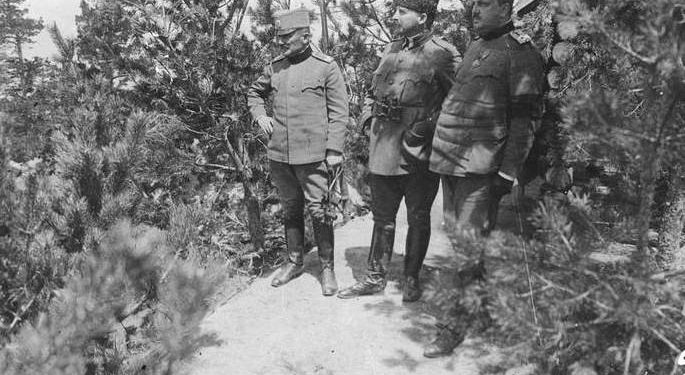By Mid’hat Frashëri
Part One
Memorie.al / Esat, the son of Ali Bey Toptani, was born in Tirana around 1860. His brother, Gani Bey, was four years his senior. From childhood, he was known for his bad and hot-tempered character. His older brother was no less so, and their father became the first victim of their malicious nature. One day they covered him with a mat soaked in kerosene (or oil) and threatened to burn him. In fact, Ali Bey was not mentally well. As he grew up, Gani Bey behaved in Tirana like a true thug (or ruffian), instilling terror among his friends and enemies.
At a certain point, he was forced to flee to Greece to escape the pursuit of the Ottoman government: this was the beginning of his career, as Abdul Hamid, alarmed by this escape, to which he attributed political importance, recalled him to Constantinople and placed him in his bodyguard battalion.
In Constantinople, Gani Bey proved to be very unscrupulous and led a dissolute life; a rivalry arose between him and Xhavit Bey, the son of the Grand Vizier of that period, Halil Fuat Pasha, and Gani Bey met his death one evening in Pera, at the hands of a person named Hafiz Pasha, a friend of the aforementioned Xhavit Bey. This murder remained unpunished, which suggests that Abdul Hamid Bey had grown tired of his protégé.
Esat had grown up in Tirana and expanded his circle of influence, which allowed him to get rid of rivals (the Jella family) and increase his wealth through means that were always illegal. Having found a way to willingly place himself in the service of Hafiz Pasha, the Governor of Durrës (who should not be confused with his homonym, Ganiu’s murderer), he was appointed head of the Tirana district, a position that allowed him to overstep without being punished. Around 1895, he was appointed by the Sultan as Commander of the Gendarmerie of Ioannina. This post cost him 1500 Turkish liras, which were paid to Marshal Dervish Pasha.
What he had done illegally in Tirana, he began to do openly and officially in Ioannina. Dervish Pasha was all-powerful in Istanbul at the time. Ganiu was the Sultan’s favorite, and Esat could afford everything without punishment, even though this post was as profitable as it was dangerous. He inaugurated the era of using bandit gangs in Ioannina, who replaced the 30 mounted gendarmes, whom he reinstated after taking 25 Turkish liras from each.
During the Greco-Turkish War of 1897, he stole all the livestock, both small and large, that he could find, and after arriving in Ioannina as the General Governor of Osman Pasha, he gave a greater boost to his own affairs, going so far as to take bribes, even of 20 francs, robbing the money of ordinary people whom he threatened with exile, meddling in administrative and justice matters, and profiting from everything.
It is impossible to make a list of his evils, thefts, and robberies. Among others, we can mention: he managed to rob the Monastery (Teqe) of Peshtan (Përmet district); he stole 900 Turkish liras from Baba Ahmeti, the chief dervish of the Teqe of Kostan; 640 liras from Baba Abedini, the Dervish of the Teqe of Frashër; 1200 liras from the brothers Xhelal and Mehmet Bey Këlcyra, and 200 liras from Abaz Bey Vasiari.
After the murder of his brother Ganiu, Esat, thinking he was at risk, sent his servant named Haxhi Mustafa, born in Kruja, to Constantinople, who killed Xhavit Bey in the middle of the Galata Bridge. The killer was arrested, tried, and imprisoned, but was treated very gently; in prison, he was a minor chief and was released a short time later and appointed a guard at the Ministry of Justice. From this, one can deduce that Hamid Bey was satisfied with the suppression of Xhavit.
Esat, although known by everyone as the true author of the murder, was not mistreated at all. But, little by little, his relations with the general government of Ioannina, Tatar Asman Pasha, became strained due to a scandal that occurred between the two. Esat was transferred to Shkodra, still with the duty of the head of the gendarmerie. This was an opportunity for the tyrant to dictate terms to his compatriots, as he resided in Tirana instead of the city of Shkodra, the capital.
Furthermore, the power he held enabled him to wreak havoc against those he disliked, those who might fight against his power, or whose wealth might worry him. It was precisely during this period that his power truly began in Tirana and Durrës, because, while persecuting honest people, at the same time he protected wicked people and demanded a share of the illegal profits that the latter might achieve; this was his way of ensuring public security, just as he had done in Ioannina.
The change of the Turkish regime in 1908 found Esat in his post in Shkodra and with the reputation of a despotic man, loyal to Abdul Hamid and his way of administration, meaning he could not have good relations with the people of the new regime and was fatally destined to plot.
But our hero was by no means lacking in dexterity: he quickly went to Thessaloniki, where the headquarters of the Committee of Union and Progress was located; it was said that the Young Turks had sentenced him to death, but 500 Turkish liras, humble attitudes, and false promises allowed him to enter the service of the unionist leaders, who supported him and helped him obtain the mandate of deputy for the Sanjak of Gjirokastra for the Ottoman Parliament.
Esat, who once owed his greatness to Abdul Hamid, this time, had to rely on the Sultan’s enemies. He thus had his place in the Ottoman Chamber, never participating in it, not wanting to play any role as an Albanian deputy, and worrying very little about defending the interests of his nation; he maintained a more servile attitude with the masters of the time, to the point that he was appointed by the latter as a member of the delegation that would inform Abdul Hamid of the overthrow of his power.
Esat was then known as one of the unionist leaders, and these good relations continued as long as the latter had power; and when the Young Turks began to weaken, when the opposing party, called liberal, seemed to be gaining success, Esat immediately changed camps, declaring himself an enemy of the Talats, the Xhavits, and the Xhahids. It was at this moment that the new Albanian nationalists established contact with him in Constantinople: he promised his help for the anti-Turkish movement that was developing in Albania (early 1912).
However, since they knew his cunning and opportunistic character, the nationalists were cautious and did not fully rely on his word. When the Albanians, who emerged victorious in Skopje, managed to force the Chamber to disband and prepared for the formation of the liberal government of Myftar Pasha, Esat was appointed commander of the reservists in Shkodra, and with this duty, he participated in the war against the Serbo-Montenegrins, who besieged the city of Shkodra (1912-1913).
The commander of the Shkodra forces was Colonel Hasan Riza Bey (earlier known as Hasan Riza Pasha). Considered intelligent and impartial, and realizing that the Albanians (bored with the Turkish regime) would help the Montenegrins, he drafted the project to raise the Albanian flag in the Fortress of Shkodra, in order to group the Albanians and make them march against the Slavic aggressor, or at least to secure their neutrality.
In fact, the independence of Albania was proclaimed in Vlorë (November 28, 1912), and the point was to convince the highlanders (highlanders of the Shkodra surroundings) that the issue of this city was their issue. At the moment when Hasan Rizai was about to implement this project and was ready to reach an agreement with the highlanders, he was killed in the evening in front of the house of Esat Toptani, where he had just been for dinner. The killer was Osman Bali, Esat’s servant and loyal man.
To explain this crime, it should be known that Hasan Riza was an opponent of the “Union and Progress” committee and that he wanted to put forward his candidacy in Baghdad as a liberal deputy. On the other hand, his Chief of Staff, Lieutenant Colonel Kiameran, along with several other officers, was a fanatic unionist; Esat wanted to get rid of Hasan Rizai to replace him himself, and Kiameran was happy to eliminate an enemy of his party; Esat and Kiameran understood each other until the end, that is, until the capitulation of the city, which happened in 1913.
It was said that Shkodra lacked food, but, on the other hand, the besieged were warned that the Serbians who were besieging the city, in cooperation with the Montenegrins, had just left: thus they were facing reduced forces and, moreover, King Nikola had been served with the ultimatum of the Great Powers to lift the siege himself.
Esat, therefore, had many opportunities to extend the resistance for a few more days, but he preferred to capitulate, contenting himself with saving his military honor. But since that period, there have been rumors that Esat’s joy had other causes than those of military “Honors” and that a sum of 600,000 francs was given to him by the Montenegrins.
Also, King Nikola and Prince Danilo helped him in his personal ambitions; on the day of the city’s capitulation, the Montenegrins spread rumors that Esat had declared himself King of Albania. However, Esat Bey Toptani was content, at first, to retreat to Tirana, with soldiers and cannons he brought from Shkodra. He was pleased with the profits and intrigues he wove, pampering low passions, the religious fanaticism of the reactionary class, and not shrinking from any promise, or any means of terrorization.
But, little by little, his attitude was outlined: it was clear that he was encouraged by the Slavs and the Greeks, promising the former Shkodra and the latter, Southern Albania. He did not find many supporters in the country but used the force provided by the Albanians of Dibra and Ohrid, regions that had recently been annexed by the Serbs and to whom he promised the liberation of their country. A deceptive promise that took on a true color from the1 Serbs’ discussions, which allowed hoping for the evacuation of Dibra and Ohrid in case Albania recognized Esat Pasha.
Furthermore, it should be emphasized that after nearly 50 villages between Dibra and Ohrid were destroyed by the Serbs – October 1913 – Esat found one more pretext for his escapes in Tirana and its surroundings. Feeling strong from this support, Esat declared himself independent from the provisional government of Vlorë. Russia undoubtedly supported Esat, and Italy did not delay in drawing him into its sphere, hoping to pit him against Austria and counter the influence of this rival…!
…He declared himself for the first time when the issue of the Empire erupted. It is known that, since Greece did not want to comply with the decisions of the London Conference and evacuate Southern Albania (Korça and Gjirokastra), it used a criminal comedy called the Autonomous Epirus, which cost Albania 300 villages burned and turned to ashes by the Greeks. The South sought reinforcements with weapons and troops, and Esat cynically refused them.
The goal pursued was evident. It was about protecting the Greeks, weakening Albania, reducing it (especially the southern provinces, which had known him as the gendarmerie chief and were very opposed to him) and managing to impose himself on the small central Albania. But a little later, Esat’s treason took an even more serious character when his complicity in the unrest that occurred in the surroundings of Durrës was recognized.
Then he was arrested and would have been judged and condemned if it hadn’t been for the intervention of Italy, which took him under its protection, snatching him from the hands of the authorities. Baron Aliotti, Minister Plenipotentiary of Italy, ordered him to be taken aboard an Italian ship; before leaving Albania, Esat pledged, swearing in writing not to set foot in Albania again.
But after Prince Vid’s departure from Albania, this oath was forgotten by Esat; he went from Rome to Greece and Serbia and, with a new force recruited in Serbian territory, appeared in Durrës. His first action was to go to the prince’s palace, sever the connections established by the international commission, and wreak havoc with the valuable objects found there, objects that mostly still remain in Geneva, in the house that Esat had rented there.
Esat remained in Durrës with great difficulty where he was surrounded by the population, which would have forced him to leave the city and Albania, if it weren’t for the Serbians who came to his aid, who unblocked him, gave him the necessary troops and means to impose himself on the Albanians. The tyrant profited from this power to take revenge on his enemies – thirty people were executed and many were killed: among them we mention Koxhati, the prefect of Durrës, who had been invited by Esat to his house. / Memorie.al




